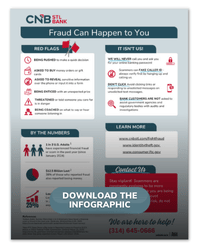We want to alert you to an increase in financial scams targeting our customers. Below, we’ve outlined some of the most common scams and included some free resources to help you stay fraud aware and prevent losses.
What's Happening?
Imposter ScamsScammers may pose as your bank, tech support, or even law enforcement via phone, text, email, or social media, tricking you into sharing sensitive information. They may ask you to click a harmful link, download something, or install software to gain access to your computer or device. In 2024, 1 in 5 people lost money to imposter scams1. |
|
Overpayment ScamsFraudsters send checks for more than what’s owed and ask you to return the difference. By the time the fake check is discovered, the fraudster has already received the overpaid funds. Do not accept a check for more that what is owed. Often, fraudsters will ask for the overpayment to be returned in a more instant form than a check such as gift cards or money orders. |
|
Romance ScamsOnline fraudsters build fake relationships, gain trust, and then ask for financial help, often under the guise of an emergency or to facilitate an in-person meeting. Romance scams are one of the most common forms of imposter scams and report a median loss per incident of $2,0002 . |
Hang Up and Call Us!
If you’re ever unsure about any contact, hang up and call us directly. Don’t respond to unsolicited texts, emails, or social media messages asking for personal information. We’re here to help you verify any suspicious outreach.
Free Resources
We're Here to Help!
Your safety is our top priority. If you believe you’ve fallen victim to a scam, please report it to us immediately. We’re committed to assisting you. Stay vigilant and contact us anytime with questions.
More Fraud Prevention Information
1 Federal Trade Comission. [Online] March 2025 https://www.ftc.gov/system/files/ftc_gov/pdf/csn-annual-data-book-2024.pdf
2 Fair, Lesley, “Love Stinks” - when a scammer is involved, Federal Trade Comission. [Online] February 2024, https://www.ftc.gov/business-guidance/blog/2024/02/love-stinks-when-scammer-involved



